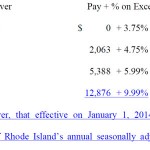Iannazzi (and Taxes) Did It
Over on Anchor Rising, commenter “movedaway” responds to my article on tax increases and taxpayer migration by listing a number of government actions that more offended him than cost him money. High income tax. Car tax (“It offended me. Grossly so since I drove a beater, appealed and they stuffed me.”). Eliminating itemized deductions. Estate tax. But the final straw came in the symbolism of Senate Majority Leader Dominique Ruggerio’s hiring of a union brother’s high-school-graduate son for a nearly $90,000 job. That’s what finally enabled the commenter to persuade his wife leave.
The lesson that I’m getting from responses to recent articles and from the research itself is that, while no particular tax or example of corruption may be significant enough to inspire drastic actions like uprooting and going away, a continual litany of them builds into a sense of culture and destroys hope for the future. Step number 1 in turning the state around, in that regard, will be to stop throwing “last straws” into the crowd — to stop giving residents that one additional reason to believe that the cause of Rhode Island is hopeless.
That’s no easy task. Even with General Assembly leaders insisting that tax increases are not in the cards, the public is justified in fearing that the political calculation may change. Every bit of legislation, therefore, no matter how unlikely to prevail, contributes to the overall sense that “they” are out to get “us.” Here are two examples that I came across while researching my tax article:
- S2462. Sponsors: Tassoni, Cote, and P Fogarty. This bill seeks to encourage municipal economic development, but it does so by raising the cap on property tax levies from its current 4% to 6%. Economic development, in other words, is not presented as something so important that local governments ought to make room for it in their budgets, but as important enough that the powers who be will allow extra tax money to be confiscated so as to leave those who already receive its rewards untouched.
- H7198. Sponsors: Valencia, Dickinson, Tanzi, Cimini, and Walsh. This bill would remove businesses’ ability to use the federal “domestic production deduction” (section 199), which allows up to a 3% deduction for “U.S.-based business activities,” for the purpose of reducing their Rhode Island tax. The Budget Office has not been asked to put together an expense/revenue note for this legislation, but Tax Foundation economists tell me that, while it’s mainly utilized by publishers at the federal level, companies in any industry can claim it.
Now, I don’t know the arguments for and against the particular deductions targeted by H7198, but on its face, the bill would remove money from the private sector in order to add it to the State House coffers. Worse, it is pointed at businesses, which are plainly critical to the effort of stopping the erosion of Rhode Island’s labor force.
Simply put, it is the responsibility of every legislator and other elected official to consider the degree to which he or she contributes to the sense that Rhode Island is a rigged, inside-player game. It may not be the tax regime per se that is driving people out, but attitudes about taxation sure do contribute to the culture.



